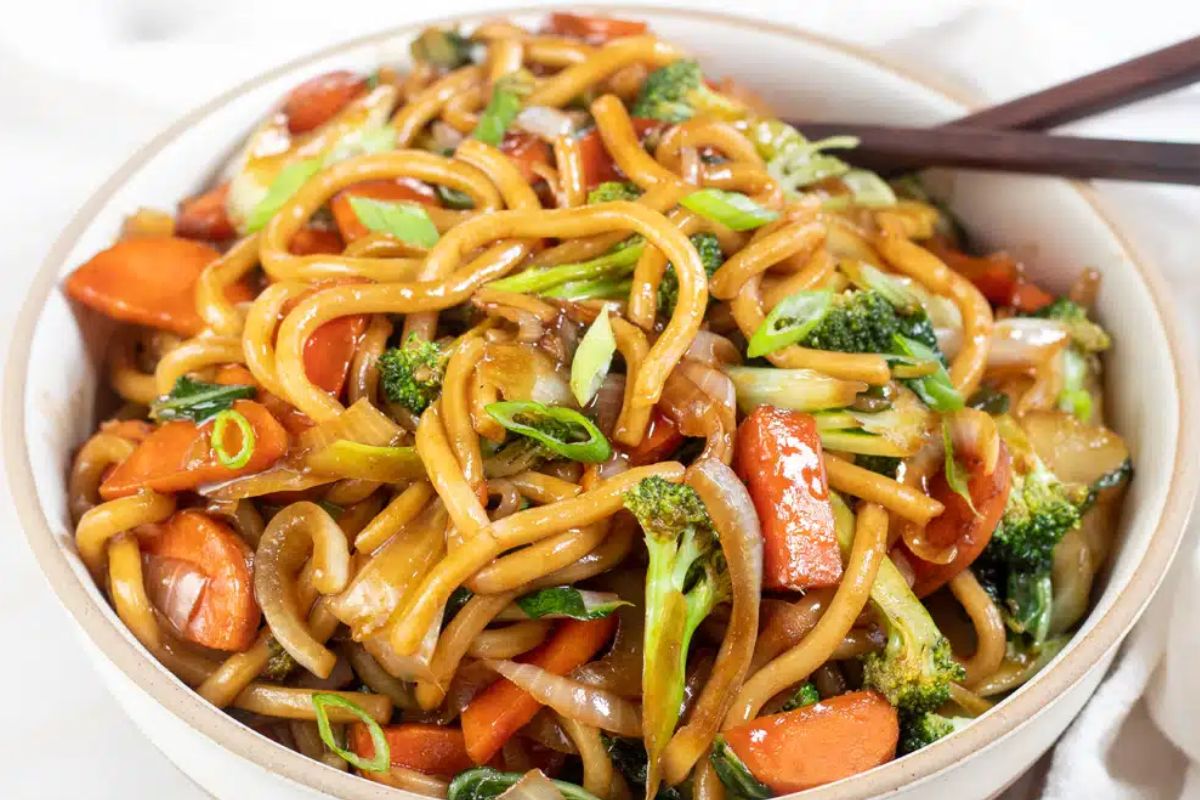Trying to figure out if Udon Noodles are vegan can sometimes be confusing.
Udon Noodles have many ingredients and some of them may be derived from animals.
To make sure you are only eating noodles that aligns with your vegan diet and ethics, I’ve looked into the ingredients and production processes of Udon Noodles.
And here’s what I found.
Are Udon Noodles Vegan?
The Basic Ingredients of Udon Noodles
At its core, the basic ingredients of udon noodles – wheat flour, water, and salt – are inherently vegan. These elements harmonize to create a noodle that is both sumptuous and aligns with a plant-based diet.
Potential Non-Vegan Ingredients in Udon Noodles
However, the caveat lies in the variations and adaptations of the traditional recipe. Certain recipes might incorporate non-vegan ingredients such as egg, which is used to enhance the texture and flavor of the noodles.
Moreover, the broths and accompaniments that often grace the udon dishes might contain fish-based products, thus veering away from veganism.
The Verdict: Are Traditional Udon Noodles Vegan?
Yes, traditional udon noodles, in their purest form, can be considered vegan. However, vigilance is required to navigate through the myriad of udon dishes available, ensuring that they adhere to vegan principles.
What are Udon Noodles?
The Traditional Ingredients of Udon Noodles
Udon noodles, a quintessential element in Japanese cuisine, are thick, chewy, and white noodles that are traditionally made from a trifecta of ingredients: wheat flour, salt, and water.
This simple concoction has graced Japanese tables for centuries, offering a comforting and versatile base for a myriad of dishes.
The Culinary Significance of Udon in Japanese Culture
In the rich tapestry of Japanese culinary artistry, udon holds a venerable position, often symbolizing comfort and simplicity.
These noodles are not merely a food item but a cultural emblem, representing the finesse and subtlety that Japanese cuisine is renowned for.
From the bustling streets of Tokyo to the serene landscapes of Kyoto, udon is a staple, enjoyed in various forms, be it in a hot broth enriched with umami flavors or a cold refreshing salad.
Why the Ingredients Matter
The essence of udon lies in its ingredients. The quality and nature of the components not only dictate the texture and flavor but also its compatibility with veganism.
Understanding the intrinsic properties of these ingredients is pivotal in discerning whether udon noodles align with vegan dietary preferences.
Vegan-Friendly Udon Noodles
Finding Vegan Udon Noodles: Tips and Tricks
To embark on a seamless vegan udon culinary journey, one must be adept at identifying vegan-friendly options.
Scrutinizing the ingredient list, opting for plain udon varieties, and choosing reputable brands that explicitly label their products as vegan can be effective strategies.
Popular Vegan Udon Noodle Brands
In the contemporary market, several brands cater to the vegan populace, offering udon noodles that are devoid of any animal-derived ingredients.
Brands such as “Koyo” and “Hakubaku” have garnered acclaim for their vegan udon offerings, providing a reliable choice for vegan enthusiasts.
Making Your Own Vegan Udon Noodles at Home (Recipe)
Embrace the joy of crafting your own vegan udon noodles at home.
With a handful of simple ingredients and a splash of creativity, you can concoct a delightful vegan udon dish that resonates with your culinary ethos.

Ingredients
Method
- Cook the udon noodles according to the package instructions, usually boiling them for about 8-10 minutes. Once cooked, drain and rinse under cold water to prevent them from sticking together. Set aside.
- In a small bowl, whisk together the soy sauce, mirin, sake, sugar, grated ginger, and minced garlic until well combined. Set aside.
- In a non-stick skillet, heat 1 tablespoon of vegetable oil over medium-high heat. Add the tofu cubes and cook until golden and crispy on all sides. Remove from the skillet and set aside.
- In the same skillet, add the remaining tablespoon of vegetable oil. Add the sliced onions and cook for 2-3 minutes, or until they start to soften.
- Add the carrots, bell pepper, and mushrooms to the skillet. Stir-fry for about 5-7 minutes, or until the vegetables are tender yet crisp.
- Add the cooked udon noodles and tofu to the skillet with the vegetables. Pour the sauce over the top and toss everything together to combine well and heat through.
- Stir in the bean sprouts and cook for an additional 2-3 minutes.
- Transfer the Yaki Udon to serving plates. Garnish with sliced spring onions and a sprinkle of sesame seeds, if desired.
- Serve hot and enjoy your homemade vegan Yaki Udon!
Notes
Dining Out: How to Ensure Your Udon is Vegan
Navigating the restaurant terrain as a vegan can sometimes be challenging.
When dining out, don’t hesitate to inquire about the ingredients used in your chosen udon dish.
Opt for restaurants that are transparent about their ingredient list and offer vegan-friendly options to ensure a delightful dining experience.
Conclusion
As we conclude, it is evident that Udon noodles are vegan friendly, as they are made with plant based ingredients.
Additional Resources:
Books for Vegan Japanese Cuisine Enthusiasts
- “Vegan JapanEasy” by Tim Anderson. You can check it here.
- “Japanese Cooking: Contemporary & Traditional” by Miyoko Schinner. You can check it here.
Vegan Cooking Classes
- Online Vegan Japanese Cooking Classes by “Cooking with Yoshiko”
- Plant-Based Japanese Cooking Classes at “The Vegan Ronin Culinary Academy”
Embark on a culinary adventure that not only satisfies your palate but also aligns with your vegan lifestyle. Happy dining!
